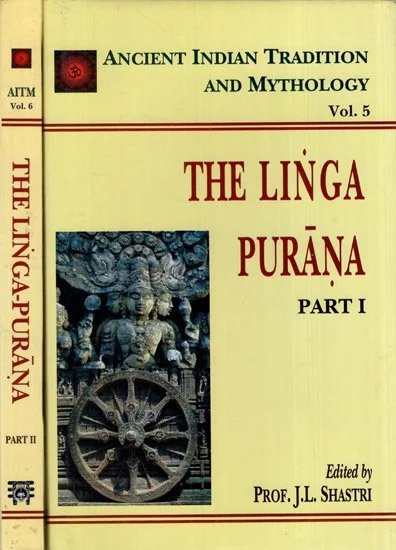The Linga Purana
by J. L. Shastri | 1951 | 265,005 words | ISBN-10: 812080340X | ISBN-13: 9788120803404
This page describes Scrubbing and cleaning the shrine of Shiva which is chapter 78 of the English translation of the Linga Purana, traditionally authored by Vyasa in roughly 11,000 Sanskrit verses. It deals with Shaiva pilosophy, the Linga (symbol of Shiva), Cosmology, Yugas, Manvantaras, Creation theories, mythology, Astronomy, Yoga, Geography, Sacred pilgrimage guides (i.e., Tirthas) and Ethics. The Lingapurana is an important text in Shaivism but also contains stories on Vishnu and Brahma.
Chapter 78 - Scrubbing and cleaning the shrine of Śiva
Sūta said:
1. O excellent sages, the holy shrine of Śiva should be scrubbed and cleaned by means of water filtered and purified with a cloth. Otherwise no Siddhi is attained.
2. O leading sages, waters that have no foam, particularly from the rivers, should be taken. When filtered with a cloth they become pure and holy.
3. Hence, O excellent brahmins, all divine holy rites should be performed by the purified waters for achieving the results in all rites.
4. Waters are mixed with minute germs. By using the unfiltered waters one attains the same sin as by killing them.
5-6. O brahmins, householders adopt violent means always while sweeping or wiping, while using fire, threshing, pounding things or while fetching water. But one shall eschew violence. Non-violence is the greatest virtue to all living creatures.
7. Hence, by all means one shall practise water purified by cloth. The meritorious and charitable gift of giving protection is the excellent of all charitable gifts.
8-10. Hence, violence should be avoided always and at all places. All violent creatures do not harm a man who abstains from violence mentally, verbally and physically. They harass one who injures others. A man who abstains from violence obtains a crore times the benefit that one attains by gifting away the three worlds to one who has mastered the Vedas. Those who are engaged in the welfare of living beings, mentally, verbally and physically and those who follow the path pointed out by kindness go to the world of Rudra.
11-15a. Those who protect persons of various sorts like a loving master or with love as if they were their own sons and grandsons, go to the world of Rudra. Hence, by all means sprinkling should be performed by means of water filtered with a cloth. The ablution should be carried out particularly. Even by killing a single person in the premises of Śiva’s temple one attains the sins that accrue from destroying the three worlds. But, O excellent brahmins, violence to flowers[1] must always be pursued for the worship of Śiva, violence to the animals for the sake of sacrifice. The chastisement of the wicked by the Kṣatriya caste can be pursued.
15b-17a. In the case of yogins expounding the Brahman these rules regarding what is laid down and what is forbidden are not applicable. They shall not be killed even if they resort to forbidden things. Similarly expounders of Brahman shall not be killed since they have eschewed all actions and taken to Sannyāsa, even if at times they are prone to sinful activities.
17b-18. Women are holy ones as they are born of the family of Atri. Even when they are engaged in sinful acts they should not be killed. They are to be worshipped always. By killing Atreyīs one incurs a sin equal to the slaughter of a brahmin.
19 -20.[2] Women from any caste should not be taken up for the Yajñas at any time, by anyone or in any place, O leading brahmins. Women engaged in sinful activities, whether they be dirty or beautiful, ugly or robed in ugly clothes should never be killed by men due to the suspicion that’ they may be Śiva.
21. Those who practise the holy rites and conduct of life outside the pale of the Vedas, those who are excluded from the rites laid down in Śrutis and Smṛtis and those who are notorious as heretics should not be conversed with by the twice-born.
22. They should neither be seen nor touched. After seeing them one should look at the sun. Still they should not be killed by kings or other creatures.
23. O brahmins, by worshipping lord Śiva even for once, thanks to the contact with good men, a man attains Rudra’s world.
24. O excellent sages, all unkind persons become miserable. So also, all men who are devoid of devotion towards the great lord.
25. Those who are devotees of Śiva, the lord of Devas, are fortunate. After enjoying pleasures here itself they become liberated.
26. The minds of men are attached towards sons, wives and houses. Just as the minds of ascetics and sages are attached towards the primordial lord. But if men turn their minds towards the lord at least once by chance the world of great Īśa is not far for them.
Footnotes and references:
[1]:
[2]:
[V-19] prohibits the slaughter of women in sacrifices implying thereby that man-slaughter (nara-vali) was a common practice. Śivatoṣiṇī interprets ‘striyaḥ’ as ‘mānuṣa-striyaḥ’ and explains that the restriction of slaughter did not apply to the female animals. Śivatoṣiṇī. quotes a scriptural saying (śruti) in support of this view: “sarasvatīṃ vaśām ālabheta.”
